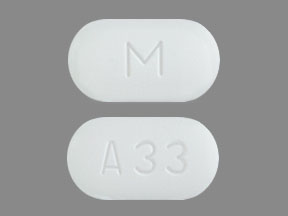Armodafinil Disease Interactions
There are 5 disease interactions with armodafinil.
CNS stimulants (applies to armodafinil) psychiatric disorders
Major Potential Hazard, Moderate plausibility. Applicable conditions: Psychosis, Depression
The use of CNS stimulants can cause psychotic symptoms, suicidal ideation, and aggression, and can exacerbate symptoms of behavior disturbance and thought disorder; CNS stimulants may induce a manic or mixed episode in patients with bipolar disorder. Psychiatric symptoms have been reported in patients with and without history of psychiatric disorders. All patients (particularly those with psychotic or bipolar disorders) should be monitored closely, especially during treatment initiation and at times of dose changes. Extreme caution should be exercised when CNS stimulants are given to patients with a history of psychosis, depression, mania, or bipolar disorder. Prior to initiating therapy, all patients should be screened for risk factors for developing a manic episode (e.g., comorbid or history of depressive symptoms or family history of suicide, bipolar disease, or depression). If any psychiatric symptoms emerge or are exacerbated, treatment suspension should be considered. Some CNS stimulants are contraindicated in patients with marked agitation or anxiety.
References
- (2001) "Product Information. Provigil (modafinil)." Cephalon, Inc
- (2001) "Product Information. Cylert (pemoline)." Abbott Pharmaceutical
- (2001) "Product Information. Ritalin (methylphenidate)." Novartis Pharmaceuticals
- (2001) "Product Information. Dopram (doxapram)." West Ward Pharmaceutical Corporation
- (2001) "Product Information. Dexedrine (dextroamphetamine)." SmithKline Beecham
- (2001) "Product Information. Adderall (amphetamine-dextroamphetamine)." Shire Richwood Pharmaceutical Company Inc
- (2001) "Product Information. Didrex (benzphetamine)." Pharmacia and Upjohn
- (2001) "Product Information. Prelu-2 (phendimetrazine)." Boehringer-Ingelheim
- (2001) "Product Information. Tenuate (diethylpropion)." Aventis Pharmaceuticals
- (2001) "Product Information. Sanorex (mazindol)." Novartis Pharmaceuticals
- (2001) "Product Information. Focalin (dexmethylphenidate)." Mikart Inc
- (2002) "Product Information. Concerta (methylphenidate)." Alza
- (2002) "Product Information. Strattera (atomoxetine)." Lilly, Eli and Company
- (2007) "Product Information. Vyvanse (lisdexamfetamine)." Shire US Inc
- (2007) "Product Information. Nuvigil (armodafinil)." Cephalon Inc
- (2012) "Product Information. Phendimetrazine Tartrate SR (phendimetrazine)." Sandoz Inc
- (2020) "Product Information. Fintepla (fenfluramine)." Zogenix, Inc
- (2023) "Product Information. Qsymia (phentermine-topiramate)." Vivus Inc, SUPPL-23
- (2019) "Product Information. Phentermine Hydrochloride (phentermine)." Tagi Pharma Inc
- (2023) "Product Information. Desoxyn (methamphetamine)." Recordati Rare Diseases Inc, SUPPL-38
Armodafinil (applies to armodafinil) alcoholism
Moderate Potential Hazard, Moderate plausibility.
Patients with excessive sleepiness, including those taking armodafinil, should be frequently reassessed for their degree of sleepiness and, if appropriate, advised to avoid driving or any other potentially dangerous activity. Patients should refrain from drinking alcohol while taking armodafinil as any drug affecting the central nervous system (CNS) may alter judgment, thinking or motor skills.
References
- (2007) "Product Information. Nuvigil (armodafinil)." Cephalon Inc
Armodafinil (applies to armodafinil) cardiovascular dysfunction
Moderate Potential Hazard, Moderate plausibility. Applicable conditions: Cardiovascular Disease, Valvular Heart Disease
Armodafinil may cause ECG changes, chest pain, or arrhythmia. Armodafinil should be used with caution in patients with cardiovascular complications. Armodafinil should not be used in patients with a history of left ventricular hypertrophy or in patients with mitral valve prolapse who have experienced the mitral valve prolapse syndrome when previously receiving CNS stimulants. It is recommended to monitor heart rate and blood pressure during treatment with armodafinil. Caution should be exercised when prescribing armodafinil to patients with known cardiovascular disease.
References
- (2007) "Product Information. Nuvigil (armodafinil)." Cephalon Inc
Armodafinil (applies to armodafinil) liver dysfunction
Moderate Potential Hazard, Moderate plausibility. Applicable conditions: Liver Disease
In a study to determine the pharmacokinetics and metabolism of armodafinil in patients with cirrhosis, the oral clearance of armodafinil was decreased by about 60%, and the steady state concentration was doubled compared to healthy patients. The dosage of armodafinil should be reduced in patients with severe hepatic impairment. Close monitoring is recommended.
References
- (2007) "Product Information. Nuvigil (armodafinil)." Cephalon Inc
Armodafinil (applies to armodafinil) psychiatric complications
Moderate Potential Hazard, Moderate plausibility. Applicable conditions: Psychosis, Depression
Armodafinil may cause adverse psychiatric reactions. Caution should be exercised when using this agent in patients with a history of psychosis, depression, or mania. If psychiatric symptoms develop in association with armodafinil administration, consider discontinuing armodafinil. Close monitoring of psychiatric symptoms is recommended.
References
- (2007) "Product Information. Nuvigil (armodafinil)." Cephalon Inc
Armodafinil drug interactions
There are 486 drug interactions with armodafinil.
Armodafinil alcohol/food interactions
There are 2 alcohol/food interactions with armodafinil.
More about armodafinil
- armodafinil consumer information
- Check interactions
- Compare alternatives
- Pricing & coupons
- Reviews (422)
- Drug images
- Side effects
- Dosage information
- During pregnancy
- Drug class: CNS stimulants
- Breastfeeding
- En español
Related treatment guides
Drug Interaction Classification
| Highly clinically significant. Avoid combinations; the risk of the interaction outweighs the benefit. | |
| Moderately clinically significant. Usually avoid combinations; use it only under special circumstances. | |
| Minimally clinically significant. Minimize risk; assess risk and consider an alternative drug, take steps to circumvent the interaction risk and/or institute a monitoring plan. | |
| No interaction information available. |
Further information
Always consult your healthcare provider to ensure the information displayed on this page applies to your personal circumstances.


